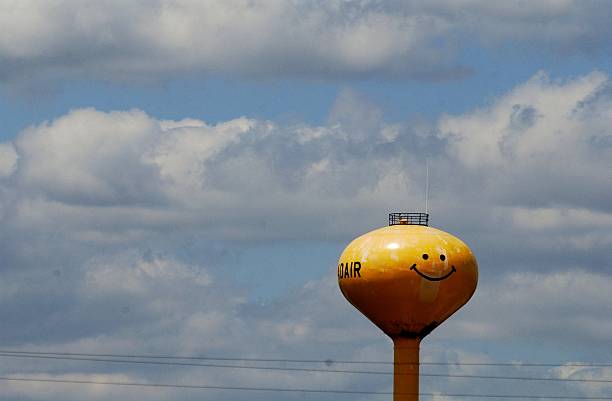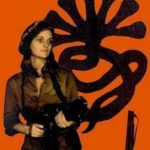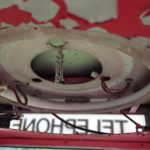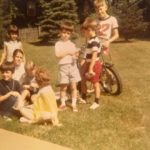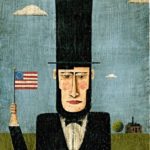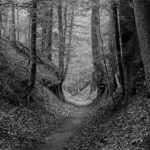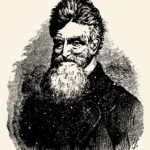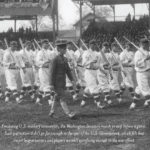In the spring of 2002, college art student Luke Helder set out to trace a Smiley Face pattern over the entire country.
More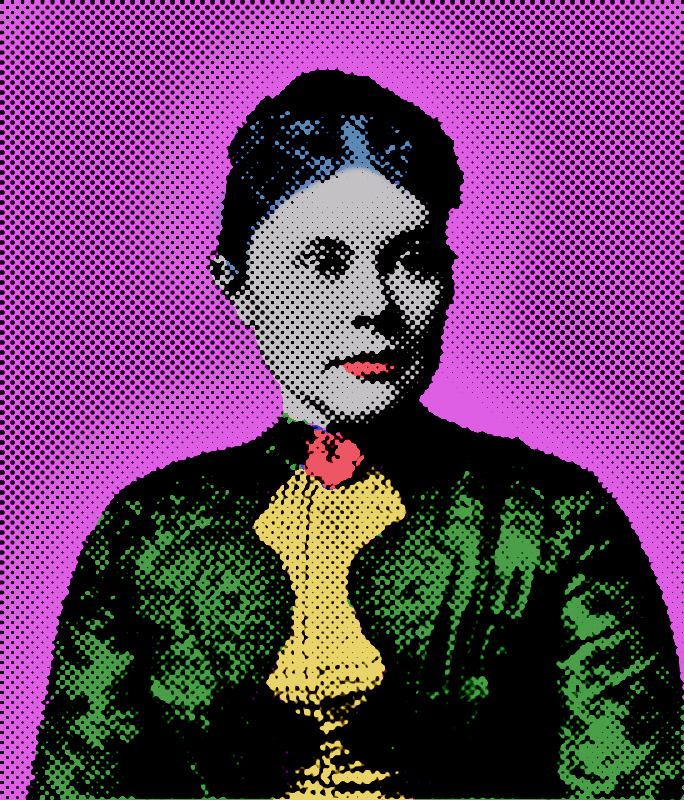

In the decades following her trial for the murder of her father and step-mother, Lizzie Borden walked the streets of Fall River, Massachusetts — a minor celebrity, and major curiosity. She tried on new identities, tried to establish some semblance of a new life, but the shadow of her past was always looming.
Lizzie Borden
took an ax
And gave her mother forty whacks
When she saw what she had done,
She gave her father forty-one.
Lizzie Borden
went to trial
came to court in grim denial.
Once the jury did acquit
All life remaining, she’d submit.
Lizzie Borden
unbow your head
there goes guilt, good townsfolk said.
When a coon coat she did try
rose up gossip, hue and cry.
Lizzie Borden
bought a house
installed plumbing, waltzed some Strauss.
When she sat at window parlor
out came children’s mocking holler:
“Lizzie Borden
offed her mom
with a hatchet and aplomb.
Though the deed was fairly done
next time neater with a gun.”
Lizzie Borden
raised her fork
traveled Europe and New York.
When she danced she quite impressed
theater friends and actresses.
Lizzie Borden
amour-propre
girls on French Street skipping rope.
There they chanted, “ho, ho, ho
Lizzie’s got no beau, beau, beau.”
Lizzie Borden
counted stars
electric lights and motorcars.
Some nights sometimes nothing’s changed
Is from one’s life one oft estranged?
Lizzie Borden
strolls tonight
gasps at starlings flock in flight.
By the town’s grave riverfront
slip of memory to confront.
Lizzie Borden
blood on hands
wakes on couch to strict demands.
When she stoops at parents’ tomb
no kneel nor prayer, no sin assume.
Lizzie Borden
fate betrayed
calls abed for chambermaid.
Most days thrums a heart jejune
Most nights summon crooning moon.
Lizzie Borden
sine qua non
chauffeured drive to Tiverton.
Feckless, faceless, friendless girl
time’s unfair when prayers unfurl.
Lizzie Borden
bids Fall River
her soul-cracked soul deliver.
Fast decades once claimed their due
retreat ere now in now’s debut.
You might be interested in
Charles Manson and his followers settled in at the Spahn Ranch, in Los Angeles County, in the summer of 1968.
The Centaur’s skin, all moon-grained in an idle mirrorreminds him of an ailing heartdrawn out in sundry mortal quests.
Between 1974 and 1976 Patricia Hearst, UC Berkeley student, scion of the prominent California Hearsts, became the most wanted fugitive
On November 24, 1963, smalltime nightclub operator and sometime underworld figure Jack Ruby walked into a Dallas police station, and
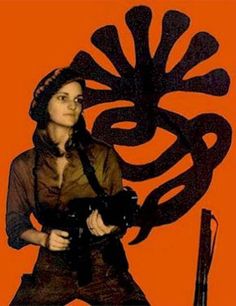
Between 1974 and 1976 Patricia Hearst, UC Berkeley student, scion of the prominent California Hearsts, became the most wanted fugitive in America.

In Southern California, 1947, they were building, they were building department stores, they were building high-rise apartments, affordable ranch houses, the big corporations were building magnificent headquarters in Torrence and Long Beach and factories in the San Fernando, and all around Wilshire Boulevard the pumpjack fields had given way to shops and movie theaters and burger joints with immaculate green and orange signs with jazzy calligraphy, and all the buildings were gradients of white that merged as a single hue at precisely 4:30 pm when the sun was highest, they were building the Arroyo Seco Parkway following an old riverbed and uncompleted wooden cycleway—a concrete- white swath bearing Paleolithic-looking automobiles from Los Angeles to Pasadena— and there were people going out into the canyons, building houses on the sides of hills, and then on Sundays the ex-GIs and businessmen and the young housewives in the houses would serve little sandwiches and jello-mould salad, with jazz records on the hi-fi, they were attractive young people with bright and modest and fortunate lives, and sometimes you’d see the movie people walking around too, whom you knew right away by their trousers and combed, undefeated looks, or you might spot someone you thought no longer alive, so contained were they by silence and black-and-white—Dorothy Gish, Theda Bara—walking along West Adams Boulevard, looking older but undefeated, still glossy, still endowed with enchanted smiles and photogenic upturned noses, and in those days you could also still go out to the orange and grapefruit groves in San Gabriel, Irvine, San Fernando, forget about Black Dahlia, forget about anything sordid and unspeakable and violent, and consider only the glinting whiteness and symmetrical exemplariness of everything, even the LA courthouse, orderly and modern and a shade of plaster white, where something called the House Un-American Activities Committee was looking into communists, finding them under rocks, finding them in the highest levels of the movie business, but you didn’t always have to think about those things, you could dive into a backyard pool, or take a green sportscar to San Carpoforo or St Orres Creek or Ventura, you could transcend history, its graspingness and futility, you could be in the present of 1947, unlinked to grandparents, great-grandparents, great-great-grandparents, who came from places like New Jersey, Connecticut, Maryland, taking a steamship around the Horn, or to Nicaragua, risking the cholera, typhoid, in the crossing, or, a couple generations later the Okies, rubes, coming in freight cars and reefers, looking for jobs in the groves and farms, no, if you were growing up now, in this time, this place, 1947, you might grow into something commensurately prospective, your own future comprised of antiseptic airplane interiors, bougainvillea and monkey flower gardens, the sun upon the flanks of clean white buildings, and upon the parkways and swept-off runways.
Up north, they were logging the redwoods, Douglas fir, they were going into forests two thousand years old, flatcars freighted with 70,000 pounds of timber bound from Tiburon to San Francisco, and the earth was a color of dark blood where the trees had been, and the mud, deeper in color, would slide down scraped-over mountains in sheets, skies aloof, and they would go out from the logging camps to Ten Mile River with their dragsaws and bulldozers and bummer carts and then at night return to the mess halls and dance halls and burned-over land, or you could go back to the century before and they were coming west for gold, argonauts collapsed along the Gila River Trail, defrauded of certainty, or some of them wandering off the gangplanks of packet liners one minute and next on their haunches by a stream, sifting their pans, sluice boxes, and there would be nuggets as big as dog paws, your life transformed, and one who happened to flourish would come overland from Missouri, with an uncanny nose for the cold scent of ore in the bedrock, a man named George Hearst, who would become father of William Randolph Hearst, who would become father of Randolph Apperson Hearst, who would become father of Patricia Campbell Hearst, who one night in February 1974 would be grabbed from her Berkeley apartment on Benvenue Street by three kidnappers, stuffed into the trunk of a 68 Impala, and two months later would be pointing an M1 rifle at baffled customers in Hibernia Bank, San Francisco, robbing it with her own kidnappers, Patty Hearst, Patty Hearst, but in Sutters Mill, California, in earlier days, George Hearst, waiting out the winters, eye on the main chance, could not consider the generational mutations his ambition might wrought, nor consider the kids of the GIs and young housewives, born in 1947, 48, 51, growing up in the houses in the Southern California hills, or houses along US Route 50 in the Missouri lowlands, who’d come to Northern California, driving station wagons, VWs, as newlyweds, students, intellectual speculators—no, George could not see that far in the future and probably nobody can, he could never see Telegraph Avenue or Market Street or Jack London Square in 1974, or the bookstore clerks, graduate students, housepainters, daughters of privilege, sons of teamsters, Sunday school teachers, Camp Fire Girls, 101st Airborne vets, he could not see Patty Hearst smoking pot with her kidnappers, cracking a can of lukewarm beer with William Harris at the drive-in movies, then next day raking a sporting goods store with machine gun fire, rat-rat-rat-rat-rat-rat-rat, twenty, thirty pedestrians diving for cover and Patty Hearst blasting away, picking up another gun and doing it again, rat-rat-rat-rat-rat.
What had been unspeakable was always there of course. Violence was like bad weather that came at once, breaking an extended spell of sunshine. In 1940 at Sunset Boulevard and Gower Street, a corner where cowboy extras used to congregate to wait for the studios to call, one of these extras, leaning against a payphone, pulled out a cowboy pistol and shot another guy in the head in front of about twenty other extras in cowboy outfits. In 1947, the Black Dahlia, so-called, a pretty unremarkable girl with troubles in her background, was dumped in a vacant lot, her body eviscerated as if surgically. The Glamour Girl Slayer… The Freeway Killer… Bobby Kennedy bleeding out on the floor of the Ambassador Hotel…. The stories were covered in every newspaper across the country, especially William Randolph Hearst’s San Francisco Examiner, which never missed a chance to put splashy murder or mayhem on the front page. Then one night in February, 1974 a petite-featured young woman—Angela Atwood, a Kappa Kappa Gamma girl, a girl voted to have most team spirit in high school, newly separated from her husband of a year—would knock on Patricia Hearst’s door, careen into the apartment, followed by William Harris (b 1945) and Donald DeFreeze (b 1943), and Angela (b 1949), would bind Patricia (b 1954) with cord and tape, and as the kidnapping squad sped off with Patty in the trunk of a convertible Impala Donald DeFreeze would fire off a few rounds at nosy neighbors for the fun of it.
In Berkeley, California, in 1974, radicalism as street theater seemed to be running out of steam, Nixon was getting out of Vietnam, Friday and Saturday nights were Partridge Family, Carol Burnett, Love, American Style, sometimes Disney on Sunday. But B-52 bombers were carpet bombing Indochina, people like Donald DeFreeze and Angela Atwood and William Harris were thinking Che Guevara, the revolution’s beau idéal and martyr, was with them, Che in his beautiful beret and fatigues was guiding them.
“Pigs,” Angela would say.
“Dig, assassination’s a political act, right, like holding a sign, only what are people going to pay attention to,” Donald DeFreeze said.
“Theoretically, the question is always about ends justifying the means,” Patty would say.
Patty came from central casting, the rebel girl, sharp-angled, with wary eyes passed down through the two Randolphs direct from George that watched the college-age revolutionaries, the communal chili pot boiling over, her mouth uncommitted. She had a mercurial quick-learning quality, when they unloosened the cords and took the racquetball ball out of her mouth she would speak with the hum-drum rhythm of someone used to lazily wielding authority. They would come across her cross-legged on the floor, they would find her reading the notebooks, manifestos, studying, puzzling over a matter of revolutionary decorum. She had questions, curiosity, Donald DeFreeze was wary, he didn’t trust her bullshit, he threatened to kill her, tested her. He told her about prisons, and the way systems were in place that a white shit girl didn’t even know were systems. A white girl didn’t know shit. He showed her how to hold a rifle, how to stand straight, how to kneel like a soldier in a real army. He let her shoot an M1, AR-80, she could hit a soup can at a hundred yards, better than William Harris, the Marine marksman, she could relate.
“My family is bourgeois,” she said one morning after sleeping all night tied up on the floor. “Everything and everyone I knew was bourgeois.”
It’s a Monday morning, it’s almost 10:00, April 15th, 1974, on the corner of Noriega & 22nd Avenue in San Francisco, and it’s unusually hot, maybe not unusually but hot nonetheless, a thickness in the air. All weekend they had to keep wiggling the antenna to get the channels, the picture was flopping in and out, they were clipping articles from newspapers, taping them to the walls, the rooms are narrow, they slept on mattresses, wherever, even fucking had a recurring obligatoriness to partners who smelled of onion powder and b.o. When they pull to the curb that Monday—DeFreeze, Camilla Hall, Nancy Ling Perry, Patricia Soltysik—DeFreeze tugs a girl’s hat over his head, like he’s robbing banks since he was six, and you’ve got your hand on the gunstock, this calamity in your throat, and to Patty Hearst all the tellers and customers looked the same, only the guards in unpressed uniforms were different. She saw herself in the security camera lens, she was Patty Hearst, aka Tania, Patricia, in wig, a revolutionary jacket, undernourished, maybe starved, the angles of her face steeper, brandishing the rifle, her voice of authority trying not to ebb. The videotape would show: she moves jerkily, her mouth moving. In less than five minutes it’s over, there’s a quick jab of automatic weapon fire, k-k-k-k, like that, Donald DeFreeze’s modified M-1 takes down a couple pedestrians, the blood splotches the material of their shirtsleeves, they’ve got $11,000, they drive away like they won the World Series.
In Southern California, 1974, the light is different, a gray of tarmacs, the gravity is different, they take the Cabrillo Highway, Tania in the back between Willie Wolfe (b 51) and Nancy Ling Perry (b 47), through San Simeon, passing near the castle where Marion Davies’ (b 1897) baroque fantasies spun in the cooling mountain air, the car feels weightless beneath them, insubstantial, they’re taking the Santa Monica Freeway west to the new house in LA, East 54th, Central Alameda, unpack laundry, dishes, notebooks, the black-and-white tv, like distracted graduate students. Plus rifles. Shotguns. Handguns. The neighborhood is shabby, like a graduate student’s dream of shabby, bittersweet vines grow through the links of the chainlink fence, styrofoam cups skidding along the street, you don’t register it any more than you register your own being, they are out one day, Tania and William and Emily Harris, bored out of their minds cruising Los Angeles in 1974, and Tania, left like a pet in the car as the couple shops, keys in the ignition, her mind decoupled, twirls her hair, waiting, her lips practicing a kiss in deference to the windshield’s reflection, there are wadded-up hamburger wrappers on the floor, a couple weapons, there were always guns, incidental tools of the ongoing revolution, then across the street William Harris is punching a store clerk on the sidewalk, Emily on the clerk’s back, Tania is trained in marksmanship, of course, but never shot one in defense of the revolution, and it’s unremarkable, almost, how your life sometimes becomes ensnared in presentness—thoroughly prepared for an unanticipated moment—she loved Willie Wolfe with his name like a cartoon character, friendly tongue in the corner of his mouth, everyone in the Army loved someone, they could love in profusion, Bill loved Emily, and Patricia Soltysik loved DeFreeze, and Patricia Soltysik loved Camilla Hall, and Nancy Ling Perry loved DeFreeze, and Angela Atwood loved Bill Harris, and Emily Harris loved a woman she met in a bowling alley, and Tania loved Willie Wolfe, she carried the immensity of love in her, the way he could be shy, then boastful in a way that was shy, his forearms slender, and the trigger could become an expression of love, an epiphany and an expression of not being petty, of not caring about the things she’d always been taught to care about.
“I am in my nature a creature of careful righteousness,” she once had said. “I am a student,” she said.
The plate glass shatters above the heads of diving bourgeois strollers.
William Harris has a handcuff around his wrist, and the clerk, twenty-something with a wiffle, returns fire, and Tania returns at him, and it’s like the movies only she’s the movie.
This was how you acted in accordance with laws of inferential statistics, revolutions were incited in coffee houses, streetcorners, campuses, why not theirs, America as Yugoslavia or Cuba or Congo or Russia, DeFreeze as Lenin/Tito/Che, they drove around all afternoon, just driving, the license plate number must have been on every cop’s dashboard in LA, there was a used Econoline for sale in front of a house, black, and William Harris pointed an M-1 at the kid selling it and said, Welcome, we’re the Symbionese Liberation Army, surprise, you’re a prisoner of war, William and Emily and Tania and the kid with a rifle barrel at his head headed off to the Century Drive-In, Inglewood, the four of them craning their necks in the Econoline to see Stacy Keach, the actor, in Cinerama. For the record, The New Centurions was playing. For the record, the kid’s name was Tom Matthews. For the record, Emily went out to get burgers for everyone at the concession, the Los Angeles night pulsing with stars. Tania liked Tom Matthews—he was a high school first baseman, above-average student, had a serious serious girlfriend, he said, he was like boys she’d known in school, eager, amiable, a little simple—and Tania loved Tom Matthews with the force of revelation and perfect conviction, the smell of his cramped bedroom still on him. They touched hands in the back of the van while they ate their hamburgers, and she didn’t know why but she told him about the sound of the plate glass shattering on the pavement and the freaked-out pedestrians, as if he might understand. George Hearst had been first and foremost a man with faith in the idea that force applied to a problem yielded results inevitably, and Tania too had known how to apply force, how to compete and come out on top, tennis, shooting, she was never one to do as she was told. When they left Tom Matthews around the corner from his house with a story to tell it was around 7 am, in time for his baseball game, he was just a kid walking down a street, waving so-long. Tania waved stalwartly. Emily Harris found them a motel, across from Disneyland, till things settled down and they could decide. From their room they could see the gates and the ersatz turrets of the Cinderella castle. The room was as comfortable as you would think, with tv and air conditioning.
The Harrises used to like tv, college basketball, the Partridge Family, things like that, they liked the clutter of voices and goofy ramshackle shows. William switched it on. Tania sat on the edge of the bed, finishing her burger, which she’d forgotten about when talking to Tom Matthews. She could fall asleep in a second.
“What you are seeing now is LAPD surrounding a yellow house with white trim, where Patricia Hearst may be.”
She heard the old name, and felt, what?, shame, curiosity, self-dissociation.
It was the first time in history something like this was broadcast live on national tv, cameramen with their minicams ducking behind parked cars, cables as thick as mambas criss-crossing Compton and East 54th. Reporters in polkadot shirts narrating into mics.
William Harris heaved a clock, making a hole in the plasterboard wall. Tania might have gone outside, pacing between cars in the parking lot, before Emily took her hand.
William Harris aimed a pistol at the tv. On tv, the cops were ducking behind cars, hoisting a little black girl over a chainlink fence. They were shooting at the yellow house with the white shutters without relenting. Semi-automatics, service revolvers. It was already past the time of giving up for everyone inside. The cops were too riled up not to shoot the first moving thing they saw in a door or a window. Nancy Ling Perry was shot, a reporter said. Camilla Hall was shot in the forehead, Angela pulled Camilla’s body inside, the reporter said. Inside the yellow house DeFreeze would have been tipping over couches, tipping over the refrigerator for a shield, in ludicrous belief they could shoot their way past five hundred LAPD cops. It was beyond the point of penitence. Tania and the Harrises would know that for a fact. The cops were going round back of the house, by the backyard with the rusted barbecue grill with a broken wheel where Tania and Willie the Wolf cooked hotdogs and squirted ketchup on each other’s bare arms. William Harris tried different channels, as if it might change what they were seeing. He waved the pistol near Tania. William Harris said get in the van, get in the fucking van, they were fucking going to join their camaradas, they could be there in an hour, maybe forty-five minutes. On the tv there were teargas canisters, spurts of flame.
There was black smoke in the white sky.
“I am in a state of what-not,” she used to say when she was a child, not knowing what she meant. “I am in a state of being the best girl.”
It was long ago.
Willie the Wolf, his tongue like a cartoon character, had spread the ketchup across her arm, and licked it off, and they fell into the grass, laughing, lighting up a joint. Now they were driving, the lonesome country songs came on the AM stations like someone else’s memories, she rolled down the window, wind slipping across her face, drying her lips, and she could see herself as someone who was easy in her relation to the world, who understood things without having to tear them apart. In the beginning, out of self- preservation, she kept her loathing of DeFreeze (she was loathe to call him the silly made-up name of General Cinque) to herself. They’d cut her throat in the name of the revolution, Cinque had said—more than once—slamming the closet door on her. Angela later snuck her a glass for her to pee in. Even she could see that Cinque had been in command of an army collapsing into the expanding sweep of its incoherence. A career prisoner, he had theorized beyond what his mind was capable of, and all that unsubstantiated theorizing had resulted in their suicide by fire. It couldn’t have been otherwise, she whispered to Emily Harris. Tania smoked, tossed the butts out the window. They were taking the old state highways, avoiding Interstates. Sometimes it felt like a vacation. There were billboards for Coppertone, Camel cigarettes, Wall Drug, churches. They saw cactus and canyons, convergences of empty spaces. The more driving they did, the less careful they were becoming. She could walk into a store, pick up Hershey bars, toothpaste, tampax, cigarettes, Coca-Cola, and she’d have forgotten her disguise wig, till after a couple times she didn’t bother with it anymore. People didn’t notice faces, she noticed, they registered elements but were incapable of assembling them. In the passenger seat on their VW, she steadied herself, watching horizons, letting her mind settle into unspeculative introspection. When she was a girl it wasn’t that easy, in the backseat of the green Cadillac that used to take her to school she sometimes felt quite queasy, and once the driver had had to pull over while she leaned out the door. She could calm herself now, block out the commotion. Block out everything.
They were the dead: Angela Atwood and Patricia Soltysik and Camilla Hall and Nancy Ling Perry. And DeFreeze. And Willie the Wolf.
“I live in a constant state of suspended animation,” she said.
“Can anyone imagine their lives,” Emily Harris said in the house outside Scranton where they were living.
They were living in the highest echelons of improvisation now. “Houdini has nothing on us,” said William Harris.
He was starting to let his hair grow, his dense beard coming in like a mountain man’s. There was a light in his brown eyes, and he was even more talkative than his usual non-stop jabbering, especially in the morning, when the Scranton sun hadn’t yet had the pipe dreams crushed out of it.
Tania cut her own hair, applied eyeshadow and lipstick, she was reading Fear of Flying, a bunch of Michener paperbacks they had lying around.
The mud in the yard came right up to the house, and they set out cardboard slabs till they became sloppy and shredded.
They were in purgatory, like Lenin in Galicia, waiting for revolution. Experiencing an anxiety of lower order bourgeois, jejune skies over the tangle of tree branches, waiting for a knock on the door. Patricia Soltysik and Cinque and Camilla Hall and Nancy Ling Perry and Willie Wolfe had been cremated by the LAPD pigs, but Tania and the others were living outside Scranton. They went to the local Giant grocery store in a beat-up pickup, wrote manifestos in the notebooks. They practiced tactics till they were ready for combat against the entire United States armed forces. The Malcolm X Combat Unit of the Symbionese Liberation Army fighting under the banner of the New World Liberation Front, William Harris said. People from California came and slept on the floor, a woman called Wendy Yoshimura, others, and Tania happened to like a hippie housepainter whose name was Steven Soliah, who went jogging in the afternoons in cutoff jeans and t- shirt, he never minded when she beat him in checkers, or if she walked ahead. Jogging together one day, Steven Soliah offered to take her back to Los Angeles or Berkeley. She might think about surrendering, he laughed.
One day a knock did come. William Harris loaded some M-2s, he handed one to Tania. Jehovah’s Witnesses. William talked to the untroubled looking young couple for an hour, maybe more, before accepting the materials, thanking the couple without irony. A traveling salesman came. Sometimes they felt out of sync, they were living in a place and time that wasn’t theirs. People on tv looked different, the actors’ shirts had lapels the size of lilypads, their smiles a performance that was hard to get beyond. In Scranton, gas-loving cars lined up, idling, waiting hours in lines that extended around corners. The old lace mills were empty, the city was hollowed out and echoed in its depletion of human striving.
A revolution needs funding. Groceries. Black powder. The electric bill. Mimeographing. Back in California, they got precisely $3729 in the Guild Savings and Loan robbery. A couple months later, $15,000 from a bank in Carmichael. In the process of the latter, Emily Harris’s gun went off, a freak accident, and Myrna Opsahl was dead, a middle- aged woman in plastic glasses, wearing a floral dress and low heels, who was depositing money into a church account of all things. Marx said, The proletariat of today enlists science in the battle against the fog of religion. William Harris and Emily Harris and Tania and Steven Soliah jumped into a Firebird, ditched the car a few blocks away, slipped into midmorning traffic in another car.
Time. Time was a variable that could not be accounted for via bourgeois modes of thinking, you had to break free of cant and clocks and coexist with time, not in defiance of it, it could only be achieved through the revolutionary expansion of consciousness, for the real genius of the revolution was that it called for an everlasting putsch against desire, it was calling for you to conform to humankind’s natural state of being—living within time, fulfilling the desire of what you do not even know you are desiring, which is the desire for desirelessness, so you can be free of grasping for property, monogamy, possessions. Revolutions, said Thomas Jefferson, were the natural order, a violent overthrow of the status quo was refreshing, as necessary, as he said, in the political world as storms in the physical. They were a tempest, overturning corrupt, warped, grasping America. They would create a substantial new relationship with time.
Could you entertain the possibility of multiple spirits sharing a single body? Tania painted houses with Steven Soliah, speckling her hands, the hair on her arms, with flecks of yellow, blue, white, she liked watching Steven Soliah up on the ladders, the sun haloing his hair like a Giotto saint, his broad back burnished by a conspiring sun. They planned to bomb police stations, pig cars, rise up to true faith. Steven Soliah would shoot hoops with neighborhood kids at the end of a cul-de-sac, mixing in with the teens and subteens, hitting long hook shots with a shrugging smirk, and Tania and Steven Soliah shopped together at Safeway, laughing at her disguise wig, the way she could move her jaw to diminish her Hearst chin. One day Tania ran across friends from high school. She fished for her sunglasses, but there was no mistaking Patricia Campbell Hearst of Crystal Springs School for Girls, Patricia mumbled, rushed out as the girls stood with their hands at their necklaces.
“Wherever you look for me,” she said, “that’s where I’ll never be.”
In Southern California, 1975, they were plowing under the orange and grapefruit groves, bulldozing mountaintops, pushing suburbs closer to the edges of the desert, a great mantle of hot asphalt steamrolled down over pastures, wetlands and chaparrals—into San Bernardino, Lakewood, Riverside, Orange County, vast treeless referenceless tracts of real estate—and people were coming from all over for the cheap houses, free sunshine, space age jobs, jobs in the movie business, jobs on military bases, they were coming for a kitchen window that looked out over a concrete patio, and everything seemed to glint simultaneously, as if kept in synch by a meticulous timepiece, beach sand, edges of waves, brand new cars, asphalt, the skin of movie stars, junkyards heaped high with discarded Oldsmobiles and Buicks, and the young families took their station wagons with V-8 motors on weekend trips to the mountains or the beaches, and you could stay overnight on the Queen Mary without ever leaving Long Beach, you could dive under the glinting waves and come up reborn, and by 1975 Nixon had departed the White House, US helicopters hovered like summer dragonflies over the Saigon embassy, and the yellow house on East 54th in LA, where the pigs had murdered their camaradas, was a bare lot, the charred remnants bulldozed into the ground as if it had never been there and as if Patricia Soltysik and Cinque and Camilla Hall, and Nancy Ling Perry and Angela Atwood and Willie Wolfe weren’t martyrs of the revolution, and in Northern California they were turning the old fallout shelters into rec rooms and dens, they were taking over the lumbering parcels in Mendocino, building mansions in the woods, Mario Savio was bartending at the Steppenwolf, and Randy Hearst was offering a $50,000 reward for information that would lead to the return of George Hearst’s great-granddaughter, not knowing she was less than twenty miles away, keeping house with Steven Soliah, the two of them taking turns washing dishes like any modern liberated couple. If it had been George Hearst who had summarized his own generation’s prodigious appetites, men like him who’d come from Missouri farms to erect monuments to themselves, it was George Hearst’s great-granddaughter, or at least the image of her in Fidel shirt and beret, carbine slung over her shoulder, looking like an armed Miami runway model, who seemed to stake a claim to her own generation’s zeitgeist, the difference being that in becoming Tania, Patricia Hearst had been acceding to forces she couldn’t quite imagine, or prevail over. In fact, by September of 1975, the revolution was becoming a little tedious, Patty Hearst was tired of clipping coupons, tired of hamburger casserole. She was playing tennis with Steven Soliah on public courts, she pedaled her bicycle around Precita Park, she saw Young Frankenstein with Steven Soliah at the Geneva Drive-In. The country was getting bored with revolution, maybe even bored with Tania. It was tired of waiting in gas lines and wretched stock market reports. Having exuberance, having flirted with overturning the bourgeois class with some yet-to-be-defined workers’ collective, had brought on a hangover.
They came one day, of course. They were always going to. William and Emily Harris were out jogging—they were from Indiana and they liked sports, fitness—when the FBI came. Patricia Hearst was in the apartment on Morse Street with Wendy Yoshimura when they came. They came up the stairs, two guys in shirtsleeves, and Wendy surrendered.
Wendy Yoshimura was a woman with deep artistic talent. She was born in an internment camp in California, and she used to sleep on the floor of the Pennsylvania farmhouse. In the apartment were a carbine, 12 gauge shotgun, two handguns and a poster of Foxy Brown scotch-taped to the wall. Patricia Hearst ran out the back, then they called her, and she came back, thin lips fiercely braced and giving a clenched fist. Her picture would be on the cover of Time magazine, of course, she would be Tania one last time.
You might be interested in
Charles Manson and his followers settled in at the Spahn Ranch, in Los Angeles County, in the summer of 1968.
Sojourning down American Highways via Thumb
The Klan in my backyard.
In the decades following her trial for the murder of her father and step-mother, Lizzie Borden walked the streets of

On November 24, 1963, smalltime nightclub operator and sometime underworld figure Jack Ruby walked into a Dallas police station, and shot and killed Kennedy assassin Lee Harvey Oswald, further obscuring circumstances surrounding Kennedy’s assassination.

LEON
In 1963 Jack Ruby moved along the perimeters of Dallas, corners of the streets and tucked-away corners where you could get something more than the clap for your troubles. Sometimes he moved within the interior: his schemes, his corner surfing, his pepped-up hopped-up way of getting up close, a friendliness that after a while wore you down. He had a way of sneaking up to you with his grin like a mole’s grin. Maybe that was the point. Wearing you out till you just went along, saw his point, came to the Carousel, take your hat off, rye and soda in the back room, couple dames, rimshot, sax blast, met a guy who knew another guy, and you could put it together and come up with a scheme that hadn’t existed. I mean, it was the thing. You hustled, turned sawdust into brass, maybe gold.
DARREL WAYNE GARNER
There was another Darrell Wayne Garner. The other Darrell Wayne Garner was thirty-seven, lived in Fort Worth, Dorothy Lane Courts. Whereas I was born in Delta County in 1940 and lived at 1006 North Bishop, Dallas. The mistake is critical to note because I was railroaded as an operator in the Warren Reynolds shooting business, whereas the other Darrel Wayne Garner was getting off scot-free. Dallas’s always been a town of cover-ups, set-ups, but this created another layer of cryptic deformation, warping of identity.
LEON
You played it right in those days, the cops, the mob, you ran your world, they ran theirs. You could be emperor of Commerce Street, people’d say, Hey Jack, How’s it going, Jack, Jack, come here a sec, can I show you such-and-such, looking fine today Jack. One day he comes up, and says, I’ve got new ladies from the bayou who come with tricks Cajuns taught their daughters since Le Grand Dérangement, customers are going to line up past South Ervay Street. Never any funny stuff with Jack. Toast for breakfast (dry) every single morning, walk his dogs, refreshing swim with a bathing cap. Jack Ruby’s charm was he didn’t understand his own charm. He was always trying to prove his charm beyond anyone’s need to be charmed.
BILL DEMAR
Jack went for crooners, magic guys, comedians. Ventriloquists in a pinch. When I got on stage, and Chuck Norwood did the talking, there was a smatter of applause, drunks trying to impress their dates. But you do your fifteen minute routine before the crooner comes out, Blue Velvet, Hello Stranger, Que Sera Sera. All bits. Routines. Besides Chuck Norwood I do Feldon the Frog, the phone routine, tape over the mouth routine: one-night stands, weekly runs, fairgrounds, banquets, conventions. I just happened to be at the Carousel that Saturday night.
CANDY BARR
Don’t ask me about Jack Ruby. That’s verboten.
CLAY SHAW
In New Orleans, the authorities were on the lookout for space and time coincidences, social coherence adding up to a most fantastic truth, or thoroughgoing delusion. Propinquities. First principles says, Deduce a working semblance down to a kernel of the truth. Think about it: if you go on the theory that motive and opportunity add up to proof, then you’ll find summation as creditable. That’s why they came after me. If the CIA, quote unquote, wants the president out of the picture, to protect American interests domestic and international, and a few rogue guys actually go so far as to talk over taking him out with poison darts, a car explosion, a sniper, that doesn’t put any of those guys in a Dallas book depository on November, 22, 1963, or standing behind a tree on a grassy knoll. Nor, even if that president was addicted to showgirls, and palled around with gangsters, and botched the Cuba invasion, does it mean anyone hired Lee Harvey Oswald to kill Kennedy, then hired Jack Ruby to kill Lee Harvey Oswald, and hired Darrel Wayne Garner to kill Warren Reynolds. It doesn’t mean an agent was sent to Betty MacDonald’s cell to smile at her, reassure her, then stick a sock in her mouth and choke her to death, and tie her toreador pants around her neck and make it look like she was a pathetic girl who couldn’t take it anymore. It’s true. The bodies started to add up. Propinquities of the dead. David Ferrie. Reynolds. Dorothy Kilgallen. Lee Bowers. Betty MacDonald. Jim Koethe. Oswald. But then again everyone dies.
BILL DEMAR
We’re all tummlers, all our lives waiting to be the main act. Ruby too.
DARREL WAYNE GARNER
In Dallas, everyone was hiding something from everyone. Everyone was knocking on a door.
CANDY BARR
All us girls danced the circuit, Omaha, Oklahoma City, Fort Worth, Des Moines, Nashville, Lubbock. A hundred bucks a week, twenty-five a night. You take the two lanes, US85, 54, up through Colorado, Oklahoma, Kansas City, roll down the window and wiggle your painted toes in the wind. I picture motels with burgundy curtains. Already the sun’s blanching the macadam parking lot. I picture a little swimming pool out front. Every one the same. I picture a laundromat, your clothes, costumes, pasties, underpants, churning round and round, the laundromats the same also. The cicadas’ chirping, extended on a horizon I can’t see, wears you out, you lay out on the car’s front seat, the radio on low, some old Nat King Cole song you’ve heard a thousand times but this time it reminds you of slow-dancing in the Edna dancehall, your arms around this guy who smelled of cigarettes and steak.
LEON
One generation from the shtetl, Jack grew up in Chicago, Near West side, klezmer up and down Maxwell Street. Nine siblings that lived. Jack was always in and out of foster homes, always looking for a way inside. He undercut the bootleggers, the low-level guys. He peddled tip sheets, took bets on baseball, the horses, a fencing match, you name it. He carried wads of cash, and on account of that a Browning Hi-Power. Loaded.
DARREL WAYNE GARNER
I lived out of my car a while, that story’s true. I didn’t always stay at my mother’s, which was a depressing dump. At night we’d drive down Commerce, past the clubs, tossing empties out the window for the thrill. People who lived nocturnally, their eyes adjusted to the gloom and stoplights, senses keen for brakes screeching, a harmonica in an alley. You have to be somewhere. You can’t be nowhere, that’s what always gets you into trouble.
BILL DEMAR
The Carousel, upstairs over the Real Pit BBQ, was always a holdover from vaudeville days, like Jack hadn’t quite caught up to 1963. Lots of the Carousel’s acts were borscht belt guys, their tuxes slick from ten years at Grossingers, Friar Tuck, how you folks doing tonight, I was lost in downtown Dallas today, minding my own business, reading a map at a stoplight a few minutes, before I figured out what a Texas longhorn was. You’d run into all of them. Jan Murray, Irving Kay, Danny Kaye. And the exotic girls. Country girls. Girls with bodies like they were born that way and could never change. Penny Dollar, Jada, Janet Conforto, Tempest Storm, Candy Barr. No one had what you’d call a real home, just the clubs, old beer tacky on the bottom of your shoes, spotlight in your eyes so you couldn’t see past the front row.
DARREL WAYNE GARNER
Some nights I’d see Betty MacDonald. She had a few kids early, and her husband was trying to take them from her. I was with her when she bought the toreador pants she eventually hanged herself with. She sashayed in them at Titches; her hips had a doomed assertiveness that gave you a jolt. Was poor Betty dying a coincidence too? Once you start, your mind seeks reason and order and meaning in the absence of meaning. Why the hell should I have shot Warren Reynolds when I barely knew the guy, just because of a fight over a car, or, even stupider, because he saw Lee Harvey Oswald kill a cop? I’m the most innocent guy in the world when it comes to laying a finger on Warren Reynolds.
CANDY BARR
Jack Ruby, I’ll say, was a sweet man. Quiet, but emotional. Excitable, say. He ran on pep pills, hot tea, Pepto-Bismol. Whenever a dancer came down with a case of the clap or a little sniffle he’d bring flowers and soup, give her a peck on the cheek. If customers offered a couple hundred bucks to meet us in rooms, cars, wherever, Jack’d take it outside, beat the guy, kick him in the head till it was like the guy was dead. Sportswriters, beat writers, cops came in the Carousel, helped themselves to beer, Jack’s private stock in back, hustling the cigarette and champagne girls. All Commerce Street was neon then, car horns going off, hustlers, hucksters, pullers. You had the Colonial, the Theater Club. Everyone was always trying to sign up the prettiest girls, the girls with gimmicks like my cowboy set. Jack drove down to New Orleans a couple times a year, scouring the streets and clubs. He had this girl once that could put her legs behind her head. Sixteen, seventeen. He wouldn’t stop talking her up, till one night she drank herself into crying over some guy she left behind, and Jack had to give her an extra couple hundred not to come back.
BILL DEMAR
The history of ventriloquism is as old as the history of hoochie-coochie girls, you know. They used to think you brought up voices of the unliving, conjuring spirits, old ancestors who lived inside you. Eventually ventriloquists ceased being shamen, they mix in the greenroom with the girls and magic acts these days, talking on the payphone to a niece from Palo Alto. There’s a gypsy doing palm reading, or a magician showing card tricks. But there was also something in the air, an atmospheric tension, a sensitivity to the unliving.
CLAY SHAW
Shaws run deep in Louisiana. Tangipahoa Parish. New Orleans. Deep in enforcement of the law. My granddaddy was sheriff, my daddy was a US Marshall. I received medals from three countries in one war. That’s one identity. Clay Bertrand another.
DARREL WAYNE GARNER
One day in 62, the other Darrell Wayne Garner quit his job at the aircraft plant, jumped bond, hopped on a bus to New Orleans, took a seat at a bar on Dauphine Street, and who was sitting there but Lee Harvey Oswald.
CLAY SHAW
A narrative through-line that made Jack Ruby, rattling around in his cell, wonder whether he hadn’t been manipulated into being a patsy, doesn’t make it a fact. The day Lee Oswald shot Kennedy I was at an establishment on Magazine Street. Someone snorted— a private laugh meant to be public. Sometimes your life gets linked to a stranger’s, hitherto totally unknown to you. You’re one person one moment, the next everything’s established for you, forces coerce you into an existence of which you’d had no awareness. But it’s you. There’s a car wreck, for example. Or you walk into a room where someone is whispering. What were the witch trials in Salem—evidence compounding into plausible miracles. Fetching water at a well one moment, next the gallows. In 1963, change was dynamic, faster than we could reckon with. I didn’t know my life was being unalterably recast. The narrative goes deeper and deeper, looking for the unsolvable, for the storage locker code that matches numbers scribbled on a wall and the back of a receipt. It’s no wonder. Look. The CIA and FBI were running covert operations, toppling governments, running guns, flying reconnaissance planes with cameras that could click a picture from 65,000 feet up. If you dialed a friend from a phone booth, they could tell if he had a hangnail. Someone decided I was alias Clay Bertrand, aligning the persona of Clay Bertrand, underworld shadow, with Clay Shaw, businessman, playwright, founder of International Trade Mart. Or was I always Clay Bertrand, slipping through the night? The name Clay signaled substance in and around New Orleans. Delta clay of the Mississippi, of Job. Thou hast made me as the clay; and wilt thou bring me into dust again. I ran into Oswald when he was passing out pamphlets on St Charles a few times. He was a tidy nondescript fellow in white shirt and tie. I took the pamphlets, and chatted with him on the corner of Canal. Did that make me Clay Bertrand? Perhaps it did. Or was I looking for myself and finding Clay Bertrand? The first time I saw Jack Ruby he was a blur on the edge of the Dallas police station crowd, a suit and a hat, destined to be that. But if you ask me Jack Ruby wanted to be remembered, Jack Ruby was like Oswald, he had infamy on the brain.
LEON
Jack believed in the religion of American life. November 22, 1963, 11:30 am, on tv, crowds were cheering, Jaqueline Bouvier Kennedy was in a gray suit and matching pillbox hat, he saw her sprayed-stiff and glossy hair, roses in her hand. He saw John Fitzgerald Kennedy’s tanned face and all the hands he was shaking, placards for JFK. 1:40 pm. Jack was watching As the World Turns. His feet were in socks, up on the ottoman. It was interrupted. The tv was saying something he couldn’t understand, as if the words were jumbled. Cronkite. He’d taken an extra pill that morning. His brow was sweating. His thoughts didn’t settle, they kept sparking off his brain like comic book paranoia. You couldn’t imagine John Fitzgerald Kennedy being a person, an actual person who had shaved this morning, fell asleep on the plane, had a bum back, shaking his schmeckle in a men’s room urinal.
CANDY BARR
In the Folly Theater, in Kansas City, signing the Artists Engagement Contract, for work as Exotic Dancers, Exotic Features, and Strip Talking Women, someone brought in a radio. In a store window, they showed the motorcade, the endless loop of Jaqueline, the Connollys, JFK with his wave, almost shy, and then the thing you can’t undo, the instant, you can’t roll back the videotape.
BILL DEMAR
Why not bring in jugglers, clowns, a menagerie. The cops, the mob guys, fraternity boys, conventioneers, guys with dates, you get the sense the whole world comes down to the stage. Saturday night, there was a sign on the Carousel that said closed.
DARREL WAYNE GARNER
There were underground guys. Guys who were detectable on some level, undetectable on another level. Like Clay Bertrand. Ruby. George de Mohrenschildt. Lee Oswald. Oswald, for instance. Oswald. Oswald. Oswald. Anyone in certain precincts of New Orleans, Fort Worth, with certain predilections, knew him, you passed him on the streets, heard his voice in your head a few seconds after he was finished talking. One thing people don’t know: the other Darrel Wayne Garner drove to Mexico City with Oswald in a rented Nash, Oswald in the passenger’s seat going on about Havana girls, their skin that smelled of clove and verbena. Oswald was at the Soviet and Cuban embassies, trying to get visas. Then there was a falling out—something about Castro and Oswald’s associates. Garner took off in the Nash, leaving Oswald to ride back on a Mexican bus with a bunch of goats. When he finally got back, Oswald didn’t exactly go underground. On a street corner, he looked like a guy no mother in the world ever wanted, his smile like an orphan smile, he was always trying to fit in. Jack Ruby was another guy who operated on different levels. After Kennedy’s brains got blown out in the back seat of the Lincoln, Ruby was moping around Commerce Street at all hours, like Kennedy was his best friend or something.
GEORGE SENATOR
After the club closed, Jack came into our apartment on South Ewing, watched some Dianah Shore, the Kennedy news, fell asleep on the couch, till the station-off-the-air signal came on. I’d wake him up, get him a blanket, tea.
CLAY SHAW
Do you think the world is more or less interesting than we think?
GEORGE SENATOR
Prosecutors brought up the moral turpitude charges, dancing after hours at the club, Jack’s friendliness with a crowd that sometimes took up the booths in the back of the room. They tore the apartment apart. But who Jack really was was him snoring Sunday morning, still in his suit, hat and .38 Colt on the side table. The dogs made a pile of themselves next to him. The tv came on at five am, the Star Spangled Banner is first thing they play.
LEON
In the old days, the entire world lived on Maxwell Street, Chicago. Mongers, stall men haggling with the shoppers and browsers. Peddler’s two wheeled carts, dogs lapping the cobbles. At the center of it, Jacob Rubenstein with his side businesses, hustles and deals. Hawking kippered herring, live chickens, rotten fruit. Jacob was always moving up. A macher. He sold door-to-door. Vacuum cleaners, shoes, Bibles. Anything. He went for stimulation, the parry and thrust of conversation. He’d spend hours in the back row at Glickman’s Palace, in soupy shadows, they had King Lear, Sholom Aleichem comedies, improvised skits of Jewish girl meets goy eyngl. Plus he worked the door a few nights a week, sometimes a puller, writing his name on the cards to tally customers at the end of the night. He played Fast and Loose, there was a scheme to sell knock-off Shirley Temple dolls, and they’d turn over Sears & Roebuck merchandise without asking how it got where it was. Where he got into trouble was when he sold a shipment of Sears & Roebuck shirts and kitchen goods to a cop, and they beat him up pretty bad, broke his nose, chased him off the street. He spent the war on American bases in the Army Air Forces, fixing planes, before he turned up in Dallas, working as a house man, promotions man, MC, anything but play piano. One thing—he’d always wanted a Cadillac, more than anything, a breathing, alive, champagne metallic DeVille, front seat like a sofa, bumper like a chrome buttress, top down, cruising Commerce Street, stopping in front of the Colony, Montmarte, waving at his customers like Mr Somebody.
DARREL WAYNE GARNER
After the assassination half the Cuban exiles and CIA operatives and Soviet spies in Dallas-Fort Worth (and there were hundreds) were scrambling to cover their tracks. Innocent people got caught in the middle and found themselves dead. Betty MacDonald for one. It wouldn’t surprise me if they came for me too.
CLAY SHAW
More propinquities. George de Mohrenschildt, né Jerzy Sergius von Mohrenschildt, was born in the Russian Empire, before the Great War. He fled the Bolsheviks to Poland and thence the United States of America sometime in the Thirties. When he got to the US, he got involved in ladies perfumes, the petroleum business and making documentaries. He got to be friends with bigshots like the Bush and Bouvier families, bounced future first lady Jacqueline on his knee when she was a child, and then in 62, in a twist the most deviant novelist couldn’t concoct, got to know Lee Harvey Oswald through the anti-Soviet underground around Dallas. All the elements came into play: Russia, Cuba, Kennedys, Oswald, revolutions, set off by a guy looking through the scope of his Mannlicher-Carcano from the sixth floor of the Book Depository. I couldn’t recall where I’d heard the name George de Mohrenschildt before. Then I remembered, of course, Comus bal-masque, 59. George introduced himself, wearing a half-fish half-warthog masque, his lips made up in rouge. His accent belonged to a nation caught between warring armies, and he was unremarkable in a stolid avuncular way. I suspected him immediately as an agent. He became friends with Oswald and his wife, visited their apartment. Perhaps both Oswald and George were double agents, freelancers, and neither knew about the other guy. These were guys with ideas that moved them into realms they couldn’t quite control. That’s why Oswald killing Kennedy, then Ruby killing Oswald, must have shocked George. He’d had genuine affection for Oswald. What had he gotten into? At the same time George must have realized that Jack Ruby, whom he must have known through the Cuba gunrunning business, might have wanted to kill him too. Or someone. He—George—was now a prime target, in the realm of time and space coincidences.
DARREL WAYNE GARNER
The mob and CIA hired Darrel Wayne Garner as the obvious and disposable patsy to take out Warren Reynolds. Reynolds knew it wasn’t Oswald who shot Officer J D Tippett, so they tried to kill him. Funny thing: after he almost got killed he changed his mind about who shot Tippet. The Nash motive was misdirection, a shiny object. Maybe it doesn’t matter. Everything was beside the point. There was something happening on the streets of Dallas, in the whole country. Just because nobody could see the whole picture didn’t mean it wasn’t real. Even people involved didn’t know how things fit together, any more than one piece knows the whole puzzle.
GEORGE SENATOR
Jack’s coat got stuck in the door. He had to reopen the door, so it was the last I saw him till I saw him on the tv an hour later.
CLAY SHAW
When George de Mohrenschildt came under suspicion as a friend of Oswald’s, he wrote to me, reminding me of our acquaintance. He asked if I could help get him in touch with someone he could trust with the truth. Truth. He was being followed by the CIA or the FBI, maybe both, he said. He’d be dead before Christmas if he couldn’t find a haven, a new identity. He wrote Jaqueline Kennedy, pleading with her, reminding her he’d been a suitor of her mother and would have married her too, he wrote. Jacqueline would have been his step-daughter. Imagine: little Jacqueline Bouvier, future first lady of the United States of America, feeding Uncle George half a tunafish sandwich on the veranda.
CANDY BARR
I didn’t know whether I was any more Candy Barr than Juanita Dale Slusher, getting the Greyhound at Edna Drug to stay with Aunt Pettigrew in Dallas. Thirteen years old. You find yourself in circumstances. I mean, being something you can’t explain. Fourteen’s young to stand up at the alter, for example, holding a bouquet of carnations, considering the long extent of a life, but buildings, especially tall gray ones, can make you feel in need of a husband. In the motels, with swimming pools outside, I woke up late, feeling the sheets’ scant weight, a feeble sun on the green curtains from behind. My body trying to unresist the day’s undertow. Saturday afternoons are matinees. On stage, bare skin smells of talcum and pear, a synthetic smell in your hair, ghost lines of cigarette smoke twirl in the spotlight. A crowd gathers you, demands you convince it there’s never been a crowd before. No one talks of the news, as they never do, everyone’s eyes over your tits, as if they have power to redeem. If they do, they do. On stage, you think about more than you’d think. Jack Kennedy comes in and out out of my head now. His beauty, the shadow of his lashes, looking at a person from under his lids. Like a forlorn eagle. You think about the Lincoln vanishing under the triple underpass, shining navy-blue, Kennedy waving, looking like the happiest man in the world. The things you can’t undo. That’s one of the things you think about. How once something’s done, the finality breaks your heart. Sunday afternoons are window shopping, looking at mink coats, record players, coffee tables, color tvs. Store to store, the same tvs you follow one to another. Stop a moment, watch in awe. The Jetsons. Disney Wonderful World of Color. Miraculous times we live in. How would it look, a color television in the apartment back in Fort Worth. People can come over and watch. Jacqueline Kennedy’s suit was pink, her hat too. I know that now. Then the police station back in Dallas, black and white again, and the assassin being moved somewhere amidst a clutch of men. Texas men with their white hats, the kind of men at the Carousel, the Colony, their faces ashen with the indoors, their business mouths and certain understanding of authority. Their smell of menthol and dust. A hand comes forward, I know it in an instant. A jerky uncertainty, a need to be. Jack’s wearing the hat I’d twirl at the end of my finger, teasing him. The assassin smirks, as if something hilarious has just been said, and Jack’s body jumps ahead in time, as if spanning decades, as if he’s envisioning every single thing, all the sturm und drang that is to come.
You might be interested in
Charles Manson and his followers settled in at the Spahn Ranch, in Los Angeles County, in the summer of 1968.
The Klan in my backyard.
In the decades following her trial for the murder of her father and step-mother, Lizzie Borden walked the streets of
Annals of weird old America: The assassination of Abraham Lincoln & its strange aftermath.
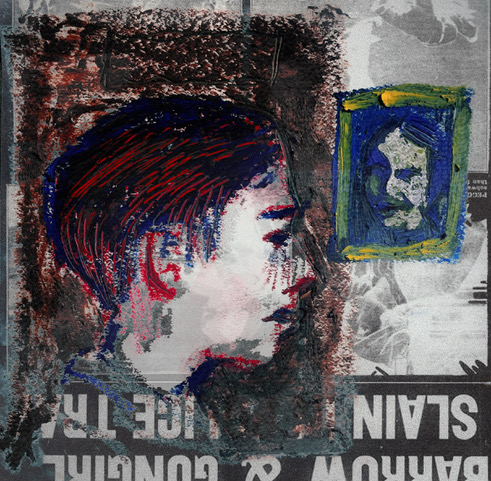
Bonnie Parker was nineteen years old and had been married four years when she met Clyde Barrow in the winter of 1930. Together Bonnie and Clyde killed at least thirteen people before they were ambushed in Bienville Parish, Louisiana, in the spring of 34, their Ford Deluxe V-8 perforated with 167 bullet holes.

Remember, out by Cement City, river banks behind grandma’s shack, canebreaks coming up the yard. Hand-to-hand. Three. One— Two— No shoes, one Texas sock, cartwheeled wrinkles from the day. Tongue cross her teeth, cotton candy between. In car window she grins. Incisors pink-tinctured. Boys. Always. Looking her over, eyes thought they owned her, eyes saying, Hey there, back seat’s open, like she has no brains. B+s in English. Best subjunior speller 1922. She married the guy anyway. Guy the five-and-dime that time. Narrow shoulders. Tooth missing—grin useless as a broken watch. Pocketed a bottle of hair cream, witnessed with her own two eyes, whistled like he found a hundred bucks back of a rented car. Liked to take her places, he did, slipped a charm bracelet on her wrist, zirconium heart and little dog and dice. Sixteen’s young for a wife, she knows, lots she knows.
Going to CCHS a married woman, living with him, his bed, sour jailhouse reek, whiskery status, afternoon striated spiteful red. Back of Jack’s Famous Billiards, the neon sign, his name pinched blue ink upon her thigh. Easy. Three letters: R-O-Y. Wild, she can be. Flashes it for school friends, shows off the ring.
Moonshine cast spells against his nature, grabbed her arm sometimes, like to snap in two. Designs of moons and planets flung amid the stars, she sprawls ground-bound, spinning comets into comets, gathering cosmoses to her skirts. A book she studies after school, states the different colors she imagines they might be. People of the different states working different jobs they do. Hammering. Offices. Farmers. Cops. Men in suits, shined shoes. She went to Oklahoma once, Mother took them on a splurge, Greyhound’s window cracked to flush the burdened air, breeze suggestion on her cheeks, strands of gold before her eyes. Air’s bluer places, you know—Oklahoma so blue that time she’d taken to spell of praying. The furious press of now—past as futures not yet taken.
To conceive of life is to feel some dying in touch of soles upon the crumbling tar. Remember taking orders at All-Day Ray’s, steak and eggs, toast and marmalade, BLT, she’d sell eggs to chickens, ice cubes to Eskimos, eyeful of her nylon bra, store-bought, whispers feathers off a peacock, Bill-Tom used to say. Bonnie, nametag on her blouse used to say. Sometimes Beth. Melissa. Harry. For a laugh. Foolin’ with people. Way she is. Used to be. They drive in fury, seeking and redemption, you’d think vacationers on a lark sometimes, could be. Way he drives in socks, she sets one foot out the window. Fitz Special in trousers waist. Browning Automatics in the trunk, 3000 rounds, magazines, cartridges, arsenal for a brigade. She styles her hair herself in motel sink, arm so twisted it’s like to break. Bobs it. Straights it. Perm. Claudette Colbert’s. Myrna Loy, she thinks. Rubs her face with Oriental Creme, toes beneath sheets curl like sleeping bishops. Going places, used to tell herself, Amelia Earhart, poet, Queen of East Texas clear to Permian Basin, rigs, shrimp boats, Little Mexico. Backyard of the old shack the Parkers live/ East Texas n’er forgive—she recites to herself, reminding. Some lives worn out from the living. Twenty-two, she is. An actress. Pretty enough, Roy used to tell her, eyes of Dallas men feasted on her like starveling urchins’, whistles in the trading district. Alone, she dresses slip and stockings, kisses the mirror, taste of glass, cool, like lips. Used to go to silents at the Kenner Palace, organ vibrations undulations of the sea. Then movies start talking, words she did too. Very sorry, Miss Gilfird isn’t in this evening, she wrote. Driving, for a moment she misses being polite without a reason.
Met this boy one day. By the Trinity. Funny voice, shooting pigeons, giggles at broken wings, plumed confetti in the river. Plays guitar. Starting a band, he says. Standards. Al Jolson. Rudy Vallee. His face’s like a little mutt. Adman’s tie’s a tongue. Scent of Burma-Shave. Took some cars one time, he says, took a ladder through window of a toy store. Do it again, get her a stuffed bear this time, he says. Walks barefoot on the riverbank, have to be rich to stroll so carelessly. Doesn’t look at her like others, like he can’t think of nothing but undressing her, listens untalking to her Hollywood talk, momentum taking her in its arms. Sunny Side of the Street, his voice sweetly. Louis Armstrong. Ted Weems. Hums along, voices braided. Tin cans, newspapers, child’s ball, stuff going downstream, under water, popping up. Bets her when stuff’s coming up again, shows a solid wad, twenties, ones beneath. Not counterfeit, he says. He ought to know, looks like. So what. She lets him, kiss, touching side of her face she gets used to before he’s done. Two fingers, then her lips. Sincerest she’s ever been—kissed—more than Roy or playground boys. Kisses her in earnest, newspapers fly as risen eagles, winged over cottonwood stands, campgrounds where the farmers tending hobo fires.
Sometimes silence settles. Takes its kindred place with stars’ reticence. Staring down highways, straight-as-light highways, misfit highways bent as crooked ladies. Does your husband / Misbehave / Grunt and grumble / Rant and rave / Shoot the brute some / Burma-Shave… Poetry everywhere. Poets of underground, Milton as roadside advertising bard. Bonnie Parker/ Born to light/Took left turn /Not the right. Oklahoma, Nebraska, Iowa, Louisiana, square-shouldered states in quandaries of conscience. One day she says to him, What’s living ever done for anyone? Mother used to take them to the revivals. Sitting on bench, under the scorching tent, preacher flapping and chairbound rising in ecstasy. Talk like that don’t suit Clyde. Tunes out, drives bent over, like trying to outpace the car. Never seen him shave, his body in motel bed smooth as a girl’s, way she touches him. It makes him cross, his mouth slicing across bottom of his face like Y in Roy.
Clyde farts when cops fall back, as if at them. Wastes a bullet on an armadillo. For fun, veers off, flattening a path through the cornstalks. How he is. Singing. Not as wild as he used to be, he says, like a petition, like they might, little farmhouse, poultry yard, dream of rocking chairs. Ha. He reads True Detective Mysteries, studying lingo, detective technique, in motel rooms. His schoolbooks. Guns on the floor in blameless beauty, oiled wood, intricate mechanism, the barrels. Pistol-grip shotgun. Hammerless Colt 32. There’s killing, but— Not real. Someone’s brother. A guy who. Are they killers, she says to him once. Doesn’t like to hear it either. Taking from some filling station. Banks. Can’t blame them, no money living way they do. Everyone feeds off ends of civilizations, he says. Gypsies, citizens like anyone, bad times, you see people along the roads, camping out. The times. A bank teller went for the alarm that time. Old man pulled a pistol. Think about it, What’d living ever do for them? Their bodies crumbled, twitched, frothed, more matter-of-fact than you think. Easy to die.
Radio plays that song Clyde likes, the Ford V8’s tenor in accompaniment. Its moment’s claim upon what can’t be sustained. Roads come up, sun breaks over corn like it wants to break your heart. World looks upside down, stars suspended, cartwheeling way she did.
You might be interested in
Charles Manson and his followers settled in at the Spahn Ranch, in Los Angeles County, in the summer of 1968.
John Murrell, prolific bandit on the old antebellum Natchez Trace, had a talent for masquerade.
Sojourning down American Highways via Thumb
It was a time of nicknames.
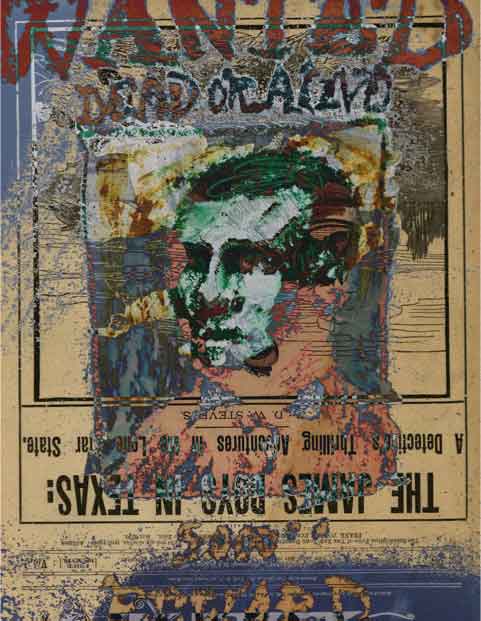
Upon his return to western Missouri after the Civil War, Jesse James never looked forward, only back, mythologizing the robberies and murder he’d commit with his brother Frank and the Younger gang till his death, seventeen years later.
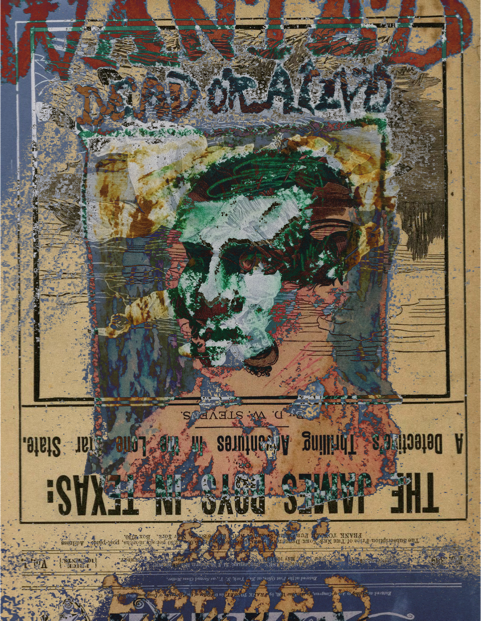
In Lawrence, there was a child with a wooden ball, tossing…. The march home, Frank, Cole, Bill, Arch, rinsing creek water over red over pebbles slipping. Squeezing one hand to stop the other trembling. These are facts. These are things. Things not learning resistance to change, knew it before. Never changed his name, always Jesse. Respectable stock, they were from. His father a minister. Prayed in church, family ate respectable food. Lima beans. Brisket. Now I lay me down to… Bushwhackers in the war, militia, nightriders ever after, the trains, banks made of stone, Federales. Inside the outside, cabins, trap doors, tramp camps. Clay County, MO, peering through cloth hood, no claustrophobia, no fear. Knights on horseback bringing order, honor, preserving Clay County. His ire up. Niggers. Nigger-lovers. Yankees. Missouri River coming down from Montana Territory, dividing the country east/west, survey lines, lines imposed by Federal law. He had to explain it, it would sound inexplicable. How you could be so strong. Have to be. Weakness overtakes you. Strength to be. It gathers, his fingers strained with lightning.
On Broadway, readers read their newspapers in the street, street urchins hawking the Tribune, Eagle, men in the bars, odors of cheroot, belching lager, read his name. Jesse James. Jesse James. The name, his name, had church music in it. It floats up in deliverance.
There’s a song upon his death. Sung in theaters. 100 seats. 150. He’d never see a man suffer pain… stopped the Glendale train… Jesse James. He believes sometimes, indulgent faith, kneels on Baptist pew. Wonders at earthly end. At the instant of the hammer click, does he recall a burned-out apple tree, his father’s deacon tenor, arms praising, hands that sluiced the hemp? Scent of hay in his hair. The father set out, 1849, pilgrim like him. Overland through Panama, round Sacramento. World he’d never see. Robert James. Preaching. Cholera. Skin shriveled, eyes, lord, sinking. Shit all over the place. Lord’s servant in California. Buried in Sutter clay region, grave a careless stone. Long past day of Robert Ford, the assassin, Frank kept the uniform of Stone Mountain and Centralia folded up in a press, till more holes than gray cloth. Frank lives, lives to age of the Somme, autos, Nigger trumpet music Jesse’d never hear.
They pass down the trunks. Freightman eyes him from the car. Eyes like a foreigner’s. Takes only an instant. Not a decision—reflex. What’s a life? Always they beg. Begging’s like a piss. The body’s odd old doing. Makes his mouth go dry. Freightman could have had trace of nigger blood in him. Wipes his face, lips. Disdains the blotch on his cuff. Him and Frank. Cole. Jim. Bob. Their voices pestering the realm of Baptist heaven. Remember Black River, 74 maybe, hauling gold, greenbacks on a borrowed mule, mules not used to snow, nostrils spooked. Borrowed mules, eyes going witless. Remember. A stranger’s door answered favorably. Frank’s hat in hand. Shakespeare, Frank could quote around a hearth for entertainment: I am in this earthly world, where to do harm/Is often laudable, to do good sometime/ Accounted dangerous folly. Breakfast grits, fatback, think you’re looking through glass pane, this stranger’s vacant life, kids, poultry yard, wife’s hair a gray streak, mouth kindly. Morning they trade mules, peel off greenbacks. An understanding. Never saw no Jesse James. Maybe he’d of been a banker himself. Jesse. His mind for figures, sizing up value. Horses, real estate. Railroads. Sometimes you go down a road, don’t know you become it. Curiosity to himself sometimes, mirror image as he drags the edge along his neck, like across a moon telling fates and lies. Jesse James. Woodcut in papers of his jawline like a horizon, his slender lips, brows like a slender woman’s. A defect in his mouth his preacher father gave him. Jesse Woodson James. The James-Younger gang has terrified this slumbering Arkansas town with the cold-blooded murder of Townes Leonidas, a 24 year old bank teller, who recently became engaged to Helene Jonson, of Arkansas. The woodcut don’t look like him at all.
Illinois Central, St Louis through Chicago, Cedar Rapids. He reads schedules better than any man, envisions night trains pounding through the mesquite hills and sage, under towering skies. St Paul. Irony, says Frank. Jesse’s smiles flickers, goes out, stealthy. He says, Shut your fliggin’ mouth. Jesse James is a passenger, luggage at his feet. Nods at others, luggage at their feet. He’s Jesse James, he doesn’t say. Jesse James is Jesse James but not Jesse James. Everyone knows he’s two. Multiplying iterations— He becomes Jesse James by necessity. Takes resistance from mud, a stuffed pallet, air stiffens around him. Snap of a twig, horse’s guffaw— Pinkertons. Assassins. Highwaymen. Yankees. Kill him easy as sippin’ coffee. Looking to be famous, big reward. Death crowds him. Takes a seat. A boy, he’d sit in front of the hearth, watching dough rise from the flames, bread brown and warm in his mouth. His mother six feet tall loomed, cattle-voiced. Doesn’t mind lonesomeness, howl of the brush and swamps. Born to lonesomeness and self-conviction, aptitudes forestal oblivion, winter’s load upon your shoulders. On the train, he regards those who are not Jesse James. Stalwart faces. Faces of careless people riding trains. They do not know existence. What is man? Ever after, he’s the one hanging a picture, life a single irreducible moment, ever-after Jesse the man hanging the picture at 10:27 in the morning of a perfect April day. Look ok to you, Bob? he says. Did it ever look ok? He’d want to know.
To become a synonym. Tourists traipsing up to the cabin, talking to Frank and their mother, the picture books, nickelodeons, movies with trumpet and saxophone bands, Robert Ford touring the country, no longer Jesse James, the idea of himself is no longer his, it’s a metaphor that leaves you out of it. Could have heard that song, folksingers like yodelers, their voices keening, rollicking, everyone in the place clapping, and, my god, America’s land of free, and Jesse James going on and on.
You might be interested in
In 1859 John Brown attempted to incite a slave revolt in Harpers Ferry, Virginia. The events of those days became
John Murrell, prolific bandit on the old antebellum Natchez Trace, had a talent for masquerade.
The Klan in my backyard.
Compulsory Patriotism: The National Anthem as Sports Ritual

